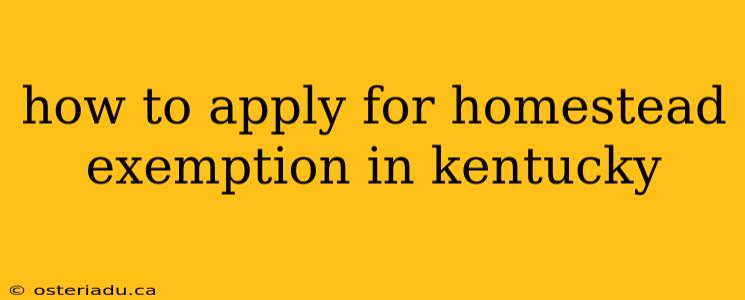Are you a Kentucky homeowner looking to lower your property taxes? A homestead exemption could significantly reduce your tax burden. This guide provides a step-by-step process for applying for a Kentucky homestead exemption. Understanding the requirements and deadlines is crucial. Let's get started!
Understanding the Kentucky Homestead Exemption
The Kentucky homestead exemption reduces the assessed value of your primary residence, thereby lowering your property taxes. This isn't a blanket exemption; eligibility depends on meeting specific criteria. It's designed to provide tax relief to homeowners, particularly those on fixed incomes or with limited financial resources. The exact amount of the exemption varies depending on your county and assessed home value.
Who Qualifies for a Kentucky Homestead Exemption?
To qualify, you must meet several conditions:
- Ownership: You must own and occupy the property as your primary residence.
- Residency: You must be a Kentucky resident.
- Age and Disability (Optional): While not a requirement for the standard exemption, additional exemptions exist for those 65 and older or with certain disabilities. These often offer higher tax reductions.
- Income Limits (Optional): Some counties may impose income limits for additional exemptions. Check with your county PVA office for specifics.
Step-by-Step Guide to Applying for a Homestead Exemption in Kentucky
The application process varies slightly by county. However, the general steps remain consistent.
Step 1: Gather Necessary Documents
Before you begin, gather the following:
- Proof of Residency: This could include a driver's license, utility bill, or other documentation showing your current address.
- Proof of Ownership: Your deed or property tax statement will suffice.
- Social Security Number: You'll need your Social Security number for the application.
- Income Information (Possibly): Some counties require income documentation, especially for additional exemptions. Consult your county PVA office.
Step 2: Locate Your County Property Valuation Administrator (PVA) Office
Each Kentucky county has its PVA office responsible for property assessments and exemptions. Find your county's PVA office through an online search or by contacting the Kentucky Department of Revenue.
Step 3: Obtain the Application Form
Most PVA offices provide applications online. You can download and print the form or obtain it in person.
Step 4: Complete the Application Accurately and Thoroughly
Fill out the application completely and accurately. Inaccurate information can delay or deny your application. Double-check all details before submitting.
Step 5: Submit Your Application and Supporting Documents
Submit your completed application form and supporting documents to your county's PVA office. There may be specific deadlines, so check the PVA's website or contact them for the exact timeframe.
Step 6: Review Your Property Tax Bill
After submitting your application, review your property tax bill to ensure the homestead exemption has been applied correctly.
Frequently Asked Questions (FAQs)
Q: When is the deadline to apply for a homestead exemption?
A: Deadlines vary by county. Contact your county PVA office for specific deadlines. It's generally advisable to apply as early as possible.
Q: What if I miss the deadline?
A: You might still be able to apply, but it depends on your county's policies. Contact your PVA office immediately.
Q: Can I apply for the homestead exemption if I rent part of my property?
A: This depends on the specifics of your situation and county regulations. Contact your PVA office for clarification.
Q: How long does the application process take?
A: Processing times can vary. Check with your county PVA office for an estimated timeframe.
Contacting Your County PVA Office
The best resource for accurate and up-to-date information is your county's PVA office. They can answer specific questions regarding deadlines, requirements, and the application process. Don't hesitate to contact them with any questions. Taking the time to understand and apply for the homestead exemption could provide substantial savings on your property taxes.
